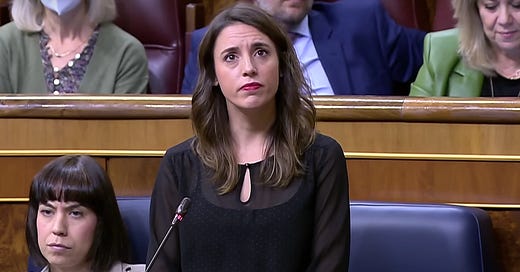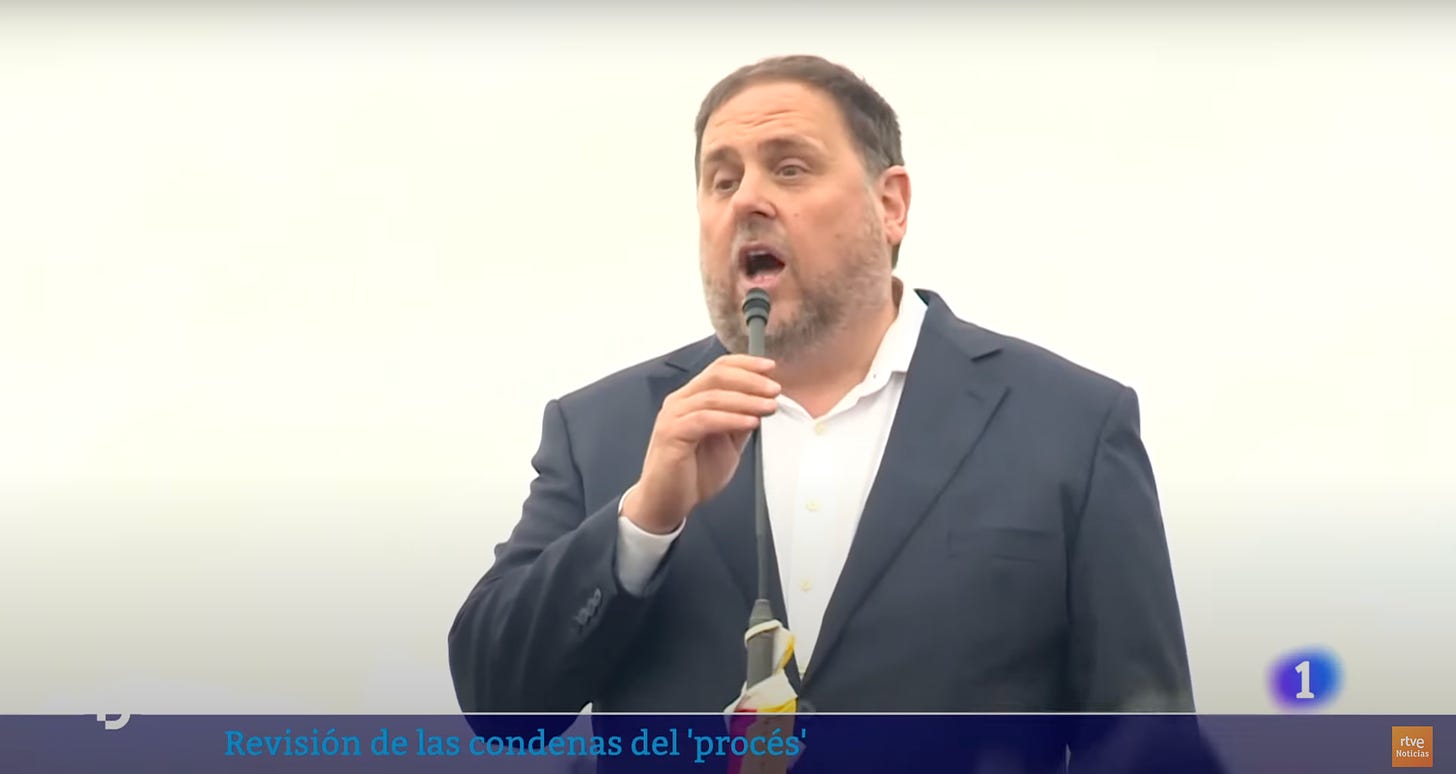February 16th, Madrid
🎉 Welcome to the first (beta) issue of Tapa, a newsletter about all things Spain!
👨🏻💻👨🏻💻 Tapa is an English-language, weekly newsletter created by journalists Ian Mount and Adrian Bono (if you never heard of us, our bios are at the bottom).
🇪🇸 Our goal is to help you understand what’s happening in Spain. If you don’t have time to follow the news, you struggle with Spanish or simply love explainers, then this is the newsletter for you.
🌎 We will cover the serious stuff (politics, economy and social issues) and the trivial stuff (lifestyle, social media, and memes).
🕒 We will make things short and simple to understand. We value your time.
🧪 Last but not least, this is our beta version so expect some things to change in the coming weeks as we listen to what readers have to say. If you hate it, we’ll change it.
Alright, let’s do this.
This Week in Politics
Scandal
🫠 1. The Chaos Over the Rollout of the “Only Yes Means Yes” Law Continues
Spain’s coalition government between the center-left PSOE and far-left Unidas Podemos is facing their worst internal crisis yet due to fallout from the implementation of the “Only Yes Means Yes” sexual consent law passed by parliament last year.
What happened: After the law’s passage, judges began reducing the prison sentences of some previously convicted sex offenders because of legal gaps in the new law’s redefined sentencing guidelines. Experts and politicians—both inside the government and in opposition—began demanding urgent amendments to the law. The problem? The different political stripes couldn’t agree on what amendments were necessary—or who was to blame.
Why it matters: Not only has it petrified many victims of the sex offenders, it’s also sparked rumors that the coalition could break up due to irreconcilable differences.
The law was spearheaded by Equality Minister Irene Montero (pictured above) and is considered her signature bill. It was an answer from the government to the national outrage that arose after a group known as “La Manada” (or “the wolfpack”) that perpetrated a high-profile 2016 gang rape in Pamplona was convicted of the lesser crime of sexual abuse because the regional court ruled the men had not used coercive violence and the victim had not resisted. (The Supreme Court later elevated the crime to rape and increased the punishment.)
The passage of the law was celebrated by progressives as a major step forward in women’s rights, because it stressed the need for explicit consent before sex (i.e. “Only Yes is Yes”). It also said rape victims wouldn’t have to prove they had suffered intimidation or violence—or had fought back.
However, things took an unexpected turn last November when some convicted sex offenders began to see their sentences reduced (and in some cases were released) thanks to loopholes in the new legislation.
Montero immediately said she stood by the text of the law and that “sexist” judges and prosecutors were to blame because they were wrongly interpreting it. She argued that sexism “can cloud the impartiality and integrity of the justice systems” and “can make judges apply the law in the wrong way.”
This became an instant headache for Prime Minister Pedro Sánchez, who was forced to defend the piece of legislation that came not from his own PSOE party but from Unidas Podemos. Unlike Montero, Sánchez avoided blaming judges and said that the government would correct any mistakes in the law.
According to El País, of the more than 3,900 sex offenders serving time in Spain, 479 of them have seen their sentence reduced, and 46 have seen rulings that call for their immediate release.
After weeks of trying (and failing) to reach an agreement with Unidas Podemos, the PSOE filed a motion to debate an urgent reform in parliament—without the support of its allies.
The decision to urgently review the text was backed by center-right PP and far-right Vox, while Unidas Podemos abstained. The debate over the amendment is expected to reach the floor of the lower chamber on March 7, on the eve of International Women’s Day (March 8).
With friends like these: The PSOE and Unidas Podemos bitterly disagree on how to change the law. The PSOE’s reform would establish higher punishments for cases with violence—effectively creating different levels of sexual assault—which has inspired Unidas Podemos to accuse the socialists of wanting to “return to the Penal Code of La Manada.”
Despite the logjam, Sánchez can’t wait anymore—the political cost of leaving the law as it is will be very, very high.
Our take: While this certainly strains the relationship between the PSOE and UP, it is very unlikely that the coalition will disintegrate before national elections in late 2023. Even fighting, they are stronger together than apart.
🏛️ 2. Catalan independence leaders face the court—again
The relationship between the ruling PSOE and Catalan pro-independence parties that often support it took a hit this week from fallout over another penal code reform that didn’t go quite as planned.
The state of play beforehand: Nine Catalan independence leaders who had been convicted and jailed over their roles in the tumultuous 2017 attempt to take Catalonia out of Spain had already been released from prison after being pardoned by Sánchez’s government in 2021. But the pardons did not remove years-long bans on holding public office.
What was expected: A penal code reform that Sánchez’s government passed in December removed the crime of sedition and reduced punishment for some misuses of public funds. It was expected to lower the punishments meted out to those Catalan independence leaders — and allow them back into public office.
What happened: The Sala de lo Penal del Tribunal Supremo on Monday handed down its revision of the sentences given to 9 leaders. It dropped the ban on 5 of leaders under the new code but retained bans until 2030/1 on the top 4, including Oriol Junqueras, the president of the ERC (Catalan Republican Left)—which had negotiated the new code with Sánchez’s socialist party.
Devil, meet the details: Under the revised penal code, sedition was replaced by “aggravated public disorder,” and the maximum sentence for misusing public funds was reduced in cases where the money was not taken for personal gain.
As they hadn’t bought Cadillacs with the public money they took for the separatist push, it seemed that they had a good chance to be unbanned. The Tribunal Supremo ruled, however, that despite this, those using public funds to hold an illegal “secessionist” referendum were in fact engaging in “aggravated” misappropriated of funds (a higher level crime) and could not be offered the leniency meant for those not seeking personal gain.
An unhappy Junqueras and his ERC said the judges were showing a “desire for revenge” and were “perpetuating political persecution with twisted interpretations” of the new law.
Whatever you think of the ruling, it’s again clear a part of Spain’s judicial branch—the conservative part, if not more—is unimpressed with the socialists’ legal reforms. In this case, the judges complained that this penal code reform “blurs the problem” of acts against the constitution and could let the authors of future non-violent attacks “unpunished”.
💬 Five things people will be talking about at dinner parties this week:
The 37th Goya Awards (Spain’s equivalent to the Oscars) took place last Saturday night in Seville and the rural drama The Beasts (As Bestas) was the big winner of the night with nine awards, including Best Picture, Best Original Screenplay and Best Director. The movie, which Variety describes as a “modern day feminist western”, revolves around a French couple working in home restoration who move to a remote, isolated area in Galicia and begin to clash with the locals.
Revered film director Carlos Saura, Spanish cinema’s “last classic director” died last Friday at 91 from respiratory failure. The prolific filmmaker, who helmed 1990’s classic ¡Ay, Carmela!, was expected to receive the Goya of Honor award during the Saturday night ceremony. A long list of local celebrities attended his wake to pay their respects and even dedicated a song to him.
 Con Carlos Saura muere una parte importantísima de la historia del cine español. Deja tras él una obra indispensable para la reflexión profunda sobre los comportamientos del ser humano. Descansa en paz amigo. #DEP #CarlosSaura
Con Carlos Saura muere una parte importantísima de la historia del cine español. Deja tras él una obra indispensable para la reflexión profunda sobre los comportamientos del ser humano. Descansa en paz amigo. #DEP #CarlosSaura

Antonio Banderas, President Pedro Sánchez and the Royal Palace were some of the local leaders and celebrities who took to Twitter to say goodbye to the iconic movie maker. Side note: Saura had a child, Shane, with American actress Geraldine Chaplin, who is the daughter of Charlie Chaplin and granddaughter of playwright Eugene O’Neill.
“I’m homosexual and I no longer want to hide myself.” With those words, the Czech professional footballer Jakub Jankto became the first player on a team in Spain’s La Liga top-flight league to come out (he’s signed to Getafe, though he’s currently on a one-year loan to AC Sparta Prague). In pretty much any other walk of life this wouldn’t be big news, but men’s professional football has marched to its own (slow) drummer. In the words of CNN, “Jankto joins Australian player Josh Cavallo as the only openly gay top-flight male footballers in the world. Jake Daniels, an 18-year-old striker for Blackpool in England’s second tier, came out in May 2022.”
After so many months of economic doom and gloom, Spain’s economy is now expected to grow around 1.6% this year. This is “mostly due to a stronger-than-expected expansion last year,” said Bank of Spain chief economist Angel Gavilan on Tuesday. As this is election season, expect that growth to be framed as something like 16% by the PSOE, and 0.16% by the PP.
The historic flamenco show that legendary music producer Ricardo Pachón put on in 1984 in Utrera, just outside Sevilla, was a religious experience for many who attended. Turns out there’s a reason for that. Architects have now discovered that the Los Montoya disco that hosted the show, which featured Camarón de la Isla, Lole y Manuel and guitarists Moraíto Chico and Raimundo Amador, had been built atop a 13th century synagogue, the most important on the Iberian peninsula.
📷 A Photo That We Think You Should See
Here is Madrid mayor José Luis Martínez-Almeida (46) getting a peculiar cake from his staffers on Valentine’s Day.
Martínez-Almeida, who is single, has always made light of the fact that he’s unable to find that special someone, usually by poking fun at himself and saying he’s “a disaster” in life. Last year, for example, a group of women celebrating a bachelorette party ran into him and took a photo with him. He posted it on social media saying “Not my wedding”. He even says he’s “lost all chance to find a partner”. So this February 14th, his staffers decided to gift him a heart-shaped cake that reads “San Solterín” (which we could loosely translate as “Happy Singletine”). Hope is the last thing you lose, Mr. Mayor!
🥂 Bonus Round: 5 Things to Do in Spain This Weekend

Carnival is back, baby! That’s right, after a two-year break due to a global pandemic, the Madrid carnaval is back in town from February 18 to 22. You can check the program here (sadly, no English version). Expect lots of street parties, live music and entertainment, especially this Saturday. Don’t miss the celebrations at Matadero this weekend. Definitely a must if you’re into live DJs, dancing and other musical performances.
Madrid’s carnaval is far from the only one in Spain. The Spanish versions are not nearly as extravagant as Brazil’s (or New Orleans’s) but there are a growing number of worthwhile ones to visit. Try Sitges’s ‘Race of the decorated beds’ on Feb. 18.
Chances are many of you reading this today are foodies. If that’s the case, I have good news, as the 13th edition of the Cocido Madrileño Route just started and will go on until the end of March.
If you’re into this traditional chickpea-based stew from Madrid, check their website and find one of the 36 restaurants participating (yes, there’s a vegan option) get ready to enjoy some of their best creations. Pro-tip: wear sweatpants. You’re welcome.
Lucian Freud is coming to town. “Lucian Freud: New Perspectives” opened in Madrid’s Museo Nacional Thyssen-Bornemisza on Feb. 14. Freud twice painted portraits of Baron Hans Heinrich Thyssen-Bornemisza, who was one of the first private collectors to focus on his work. The Baron looks pained in his 1982 portrait—which is not surprising considering that Freud required up to 100 hours of sittings to complete a painting. Fun factoid: Jerry Hall couldn’t handle the sitting. When she couldn’t fit Freud’s painting time in her agenda and left during Large Interior, Notting Hill, 1998, Freud replaced her with his studio assistant, David Dawson—who can be seen in Hall’s role, nursing a baby.
And Goya is leaving. This weekend will be your last chance to see the restoration of the first two preparatory oil sketches made by Goya for the painting La predicación de San Bernardino de Siena (The sermon of Saint Bernardino of Siena. The Prado Museum’s exhibition is in Sala 34 of the Edificio Villanueva building.
🔔 A Message From Our Sponsor
Secret Kingdoms is your English bookstore in Madrid. It specializes in Spanish history and literature, contemporary and classic novels, books for children and young adults of all ages, history and historical fiction, thrillers, science fiction, fantasy, poetry, biographies and much more.
Located on Calle de Moratín 7 — a few blocks away from the Prado Museum — and with over 20,000 new and used books, Secret Kingdoms has something for everyone.
Find out more at www.thesecretkingdoms.com
🙏 Before you go, please remember to share this newsletter with your friends on social media. The more we grow, the more information we’ll be able to offer each week.
We’ll be back next week with more.
👥 About the authors
Ian Mount
Ian Mount is a Madrid-based writer, editor and journalist who has written about politics, business, economics, sports—and wine—in the U.S., Argentina and Spain for more than two decades.
Ian’s news stories and features have appeared in print and on radio at the Financial Times, the New York Times, NewYorker.com, Bloomberg Businessweek, New York, Fortune.com, The World, Marketplace and many other outlets.
His book The Vineyard at the End of the World: Maverick Winemakers and the Rebirth of Malbec (W.W. Norton, 2012), was chosen by JPMorgan Private Bank for its annual summer reading list (aka the “Billionaire Book Club”).
Ian has run three sub 3:10 marathons and would really like to break the three-hour barrier but is coming to admit that, with the passage of time, this is looking increasingly unlikely.
Ian is on Twitter at @IanMount
Adrian Bono
Adrian Bono is a multimedia journalist and media consultant who has been covering politics and pop culture in the US, Latin America and Europe for over a decade.
His opinion has been featured in the BBC, NPR, Al Jazeera and Univision, and he has appeared as a contributor on The Guardian, Monocle and Business Insider.
He has worked for influential publications such as Infobae and the Buenos Aires Herald and has been invited to speak on the future of journalism and the rise of disinformation Latin America, the United States and Europe.
He has a Bachelor’s Degree in Social Sciences and Humanities from Universidad de Palermo (Argentina) and a Master’s Degree in Fact-checking, Digital Verification and Data Journalism from Universidad CEU San Pablo (Spain). He is based in Madrid.
Adrian is on Twitter at @AdrianBono







